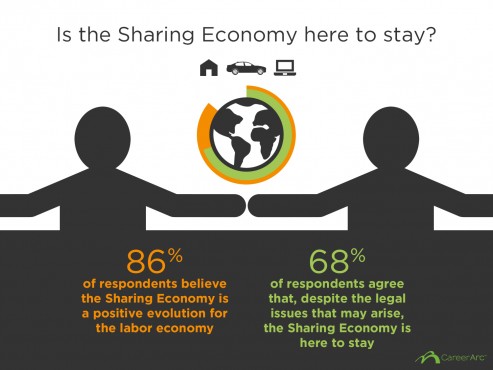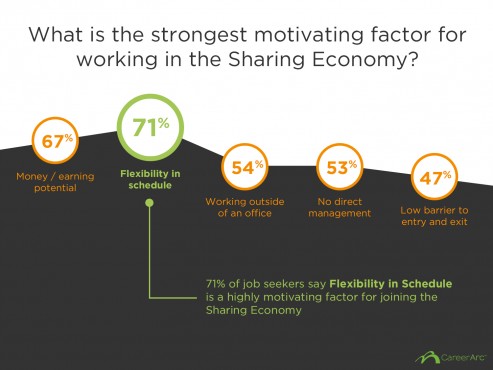Why Employers Need to Pay Attention to What’s Happening in the Sharing Economy

That being said, a new survey from HR software providers CareerArc suggests that I’m in the minority. CareerArc found that 89 percent of employers and 85 percent of job seekers see the sharing economy as a “positive evolution of the labor economy.” Furthermore, 57 percent of job seekers have thought about joining the sharing economy.
The folks at CareerArc believe that all employers — even those that do not operate within the sharing economy — should be paying careful attention to what’s going on in this particular corner of the job market.
“With the explosion in freelance and sharing economy workers, companies are going to start interacting with candidates who have experienced that world,” explains Yair Riemer, CMO at CareerArc.
Job seekers who have experienced the sharing economy often walk away with a newfound taste for flexibility, entrepreneurial work styles, and freedom. Their time in the sharing economy will play a role in what they want from traditional, full-time employers, says Riemer. Employers who can’t give job seekers these things may find themselves missing out on top talent.

Don’t Worry — the Sharing Economy Won’t Steal Your Workforce
The sharing economy may influence job seekers’ desires, but it’s probably not going to lure them away from the world of full-time, traditional employment, Riemer says.
“There will be some overlap, but it looks like a lot of the people who do these jobs [in the sharing economy] do them during transitional periods,” he explains.
CareerArc’s survey found that 72 percent of job seekers said they would consider joining the sharing economy if they were faced with a “sudden job loss,” and that 63 percent of job seekers and 72 percent of HR professionals believe most people working in the sharing economy are “unemployed individuals in transition from a job loss, or employed individuals who seek supplementary income.”
(Of course, these are beliefs, not economic facts, so they should be taken with a grain of salt.)
“It’s not going to be a direct brain-drain, but I do think the [sharing economy] will drive a rise in confidence and entrepreneurship within the workforce that employers are going to have to be sensitive to,” Riemer says. “I think it will be a benefit for companies, actually.”
How the Sharing Economy Will Hit HR Departments
CareerArc’s survey also found, curiously enough, that a lot of HR professionals — 65 percent, to be exact — think the sharing economy will have a major impact on them. This is interesting to me, because it’s not like anyone is going to start a TaskRabbit for HR functions (which, actually, might be pretty hilarious).
Riemer, however, has a pretty good explanation for why HR professionals are worried about the sharing economy’s impact on them: They just want to make sure they keep up with the shifting statuses of the workers who join their companies.
“I think the HR profession is one where there is a strong sense of certification and a strong sense of regulation,” Riemer says. “HR people want to know, ‘How will this impact me and my job when it comes to hiring?'”
For example, job seekers who spent time in the sharing economy may want to be classified as part-timers instead of full-timers, or they may want different sorts of benefits. They may want to rework the classic employment structure — and HR folks are going to be the ones who have to make sure that such reworkings don’t lead to legal trouble for the company later on down the line.
The sharing economy affects everyone, even those who never enter it. It leaves a mark on job seekers, which is carried back to employers, who will have to accommodate the newfound wants of job seekers (or risk losing out on great talent).
So recruiters, employers, HR pros — basically, everyone involved in hiring — take note: You gotta pay attention to what’s going on in the sharing economy, or you may regret it.

